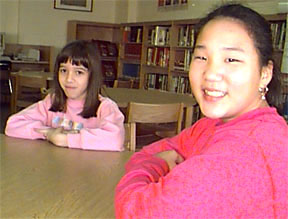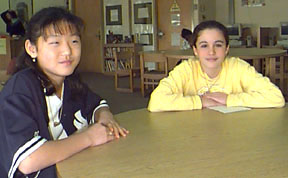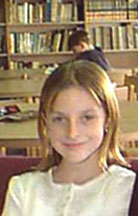



|
Internet Keypals
Eight girls from New Jersey have experienced the trials and triumphs of doing Internet keypals, and have some good advice to offer the rest of us! By Alicia M. Bartol SCR*TEC |
|
Keypals are the modern e-mail version of traditional penpals. Not only do students learn together about each others' cultures and lands, but they also make faraway friends, creating an exciting new reason to read and write. The possibilities and uses for keypals depend upon the creativity and the flexibility of collaborating teachers. There is a wealth of human resources at your fingertips in the form of collaborating classrooms here and abroad. |
 Amanda and Rinku, from Strathmore Elementary. |
|
| One aspect of this planning is timing. As experienced teachers and students can attest, it's easiest to find keypals at the beginning of the school year, or at the start of the quarter. The trick is to find out if your school begins at the same time that schools elsewhere start. For interstate or Canada-US exchanges, this is not usually a problem. However, international exchanges often need more forethought. In looking for keypals, find out more than just the school year of the exchanging school. Inquire about the entire calendar, vacations and all. Conflicting school schedules can make keypals as slow as penpals at times. |
 Megan and Amy had keypals in Australia! |
|
| Amy says, "I expected to find out how their school was, if their lives were pretty similar to ours because they're a long distance away, and we'd talk about our family, our pets, if we had dogs or cats, or what sports they like to play." In fact, most of the girls wanted to know quite a lot about their new keypals. Megan wanted to know about her Australian keypal's family, and about Australian animals, while Hana wanted to know what her Inuit keypal did for fun, and what kind of games they play in the Arctic. These get-to-know-you e-mail sessions will lead to bigger and better things. Hana ended up learning about dog sledding, and the races that they do every winter in Rankin Inlet, Canada. Amanda and Meghan discovered that Canberra was not the clean, flower-covered paradise they had envisioned, and that it actually had a pollution problem. |
 Hana and Christie had keypals from Canada and Australia respectively. |
|
| |
 Meghan had a keypal in Australia. |
|